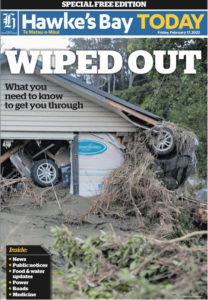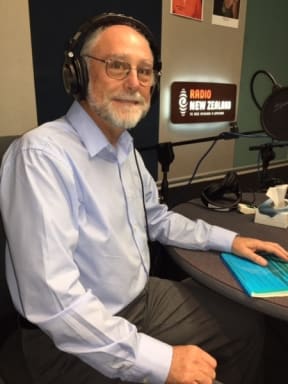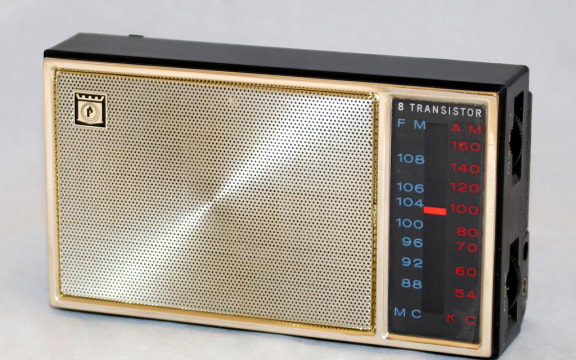New Zealand’s media were in emergency mode yet again this week, offering hours of extra coverage on air, online and in print.
Outlets in the hardest-hit places reported the basics — even without access to basics like power, communications and even premises.
What will Gabrielle’s legacy be for media’s role in reporting disasters and national resilience?
- LISTEN TO RNZ MEDIAWATCH: Before and after Gabrielle
- Cyclone Gabrielle: Death toll rises to 11, Civil Defence targets isolated communities
- Cyclone Gabrielle: Pasifika songs of gratitude ring out across Hawke’s Bay
- LISTEN TO RNZ PACIFIC WAVES: Susana Suisuiki reports
- Cyclone Gabrielle death toll rises to 9, thousands uncontactable and landslide risk in Auckland
- Cyclone Gabrielle: Where to donate
- Follow RNZ live updates
“Keep listening to the radio. You guys have done a great job updating people and it’s very much appreciated,” the Civil Defence Minister Keiran McAnulty told Newstalk ZB’s last Sunday afternoon as Gabrielle was just beginning to wreak havoc.
Barely two weeks earlier, sudden and catastrophic flooding in and near Auckland caught the media off-guard, but some commentators claimed the heavy warnings about Gabrielle were oppressively ominous — and risked “crying wolf”.
Gabrielle ended up as a national emergency and sparked non-stop rolling news coverage. There were few flat spots on TV and radio, and live online reporting around the clock also give a comprehensive picture — and pictures — of what was going on.
It stretched newsrooms to their limits, but news reporters’ work was skillfully and selectively supplemented with a steady stream of vivid eyewitness accounts.
Forestry slash flood
Tolaga Bay farmer Bridget Parker’s description on RNZ Nine to Noon of yet another inundation at her place with added forestry slash was among the most confronting (and sweary).
Checkpoint’s emotional interview on Wednesday with a couple that owned a house in which a friend “disappeared under water” was compelling — but also chilling.
RNZ’s Kate Green arrived in Gisborne on Monday with the only means of communicating that worked — a satellite phone.
“You can’t even dial 111. Everything that can break is broken,” she told RNZ Morning Report listeners, quoting the local mayor.
RNZ’s Māni Dunlop, who managed to fly in on Tuesday, told listeners that from the air the East Coast looked “buggered”.
Gisborne is a city and Tairawhiti a region not well covered at the best of times by New Zealand’s national media, which have no bureaux there. It is a bit of an irony that in the worst of times, it was so hard to get the word out.
But the locally-owned Gisborne Herald stepped up, somehow printing editions every day distributed free to 22,000 homes — with the help of NZDF boots n the ground on some days.
Proud news day
“I’m proud to be working on this paper today,” reported Murray Robertson said, signing off an eye-opening video of scenes of the stricken city posted online once power came back and a fresh Starlink unit kicked in.
On Wednesday, ZB’s Mike Hosking pleaded on air for diesel to keep their signal up in Hawke’s Bay, while the editor of Hawke’s Bay Today Chris Hyde — only months into his job — found himself literally powerless to publish when the rivers rose, cutting the electricity and cutting him off from many of his staff.
“The first day I was in a black hole. In a big news event, the phones ring hot. This was the biggest news event in Hawke’s Bay since the Napier earthquake . . . and my phone wasn’t ringing at all,” he told Mediawatch.

Hyde, just 32 years old, was a student in Christchurch when The Press stunned citizens by publishing a paper the morning after the deadly 2011 quake.
Hyde said NZME chief editor Shayne Currie and The New Zealand Herald’s Murray Kirkness were instrumental in putting the Auckland HQs resources into getting NZME’s upper North Island dailies promptly back in print and available for free.
“Just keep supporting local news, because in moments like this, it really does matter,” Chris Hyde told Mediawatch.
On Wednesday, Hyde had the odd experience of seeing Tuesday’s edition of the paper on the AM show on TV before he had even seen it himself.
Cut-off news focus
On Wednesday, RNZ switched to focus on news for areas cut off or without power — or both — where people were depending on the radio. RNZ’s live online updates went “text-only” because those who could get online might only have the bandwidth for the basics.
Day of ‘danger’
This is the first copy of Tuesday’s @hawkesbaytoday that I’ve seen. It never made it to my home, to our offices, to our subscribers. When I wrote that headline had some idea of what was coming, and yet we had no idea. pic.twitter.com/57PmhoeyYr
— Chris Hyde (@chrishydejourno) February 16, 2023

“Thank God for news media in a storm,” was former Herald editor Gavin Ellis in his column The Knightly Views.
He was among the critics of media coverage of Auckland’s floods a fortnight earlier.
Back then he said social media and online outlets had trumped traditional news media in quickly conveying the scale and the scope of the flooding.
This time social media also hosted startling scenes and sounds reporters couldn’t capture — like rural road bridges bending then buckling.
But Gavin Ellis said earlier this week he couldn’t get a clearer picture of Gabrielle’s impact without mainstream media.
“Those two episodes where chalk and cheese. Coverage of Cyclone Gabrielle by all media was excellent, both in warning people about what was to come – although that wasn’t universal – and then talking people through it and into the aftermath, And what an aftermath it’s been,” he told Mediawatch.
“This is precisely why we need news media. They draw together an overwhelming range of sources and condense information into a readily absorbed format. Then they keep updating and adding to the picture.” he wrote.
Retro but robust radio
“It’s even more pressing if you haven’t got electricity, and you haven’t got those online links. That was when radio really came into its own,” said Ellis.
“Organisations like the BBC,and the ABC (Australia) are talking about a fully-digital future and moving away from linear broadcasting. What happens to radio in those circumstances if you haven’t got power? If you’re sitting on your rooftop surrounded by water, you can still have a radio on, he said.
“We need to have a conversation about the future of media in this country and the requirements in times of urgency need to be looked at,” Ellis told Mediawatch.
RNZ’s head of news Richard Sutherland’s had the same thoughts.
“It has certainly been a reminder to generations who have not been brought up with transistor radios they are important to have in a disaster. This will also sharpen the minds of people on just how important ‘legacy’ platforms like AM transmission are in civil defence emergencies like the one we’ve had,” he said.
“With the Tonga volcano, Tonga was cut off from the internet. and the only thing getting through was shortwave radio. In the 2020s, we are talking about something that’s been around since the early 1900s still doing the mahi. In this country, we are going to need to think very carefully about how we provide the belt and braces of broadcasting infrastructure,” he told Mediawatch.
“Everyone was super-aware of the way that the Auckland flooding late last month played out — and no one wanted to repeat that,” said Sutherland, formerly a TV news executive at Newshub, TV3, TVNZ and Sky News.
“Initially the view was this is going to be bad news for Auckland because Auckland, already very badly damaged and waterlogged. But as it turned out, of course, it ended up being Northland, Coromandel, Hawke’s Bay have been those areas that caught the worst of it,” Sutherland told Mediawatch.
News contraction
“Over the years, and for a number of reasons, a lot of them financial, all news organisations have contracted. And you contract to your home city or a big metropolitan area, because that’s where the population is, and that’s where the bulk of your audience is,” he said.
“But this cyclone has reminded us all as a nation, that it’s really important to have reporters in the regions, to have strong infrastructure in the regions. I would argue that RNZ is a key piece of infrastructure,” he said.
“This incident has shown us that with the increasing impact of climate change, news organisations, particularly public service lifeline utility organisations like RNZ, are going to have to have a look at our geographic coverage, as well as our general coverage based on population,” he said
“We are already drawing up plans for have extra boots on the ground permanently . . but also we need to think where are the regions that we need to have more people in so that we can respond faster to these sorts of things,” he said.
“We are at a moment where we could do something a bit more formal around building a more robust media infrastructure . . . for the whole country. I would be very, very keen for the industry to get together to make sure that the whole country can benefit from the combined resources that we have.
“Again, everything comes down to money. But if the need is there, the money will be found,” he said.
Now that the government’s planned new public media entity is off the table, it will be interesting to see if those holding the public purse strings see the need for news in the same way.
This article is republished under a community partnership agreement with RNZ.
Cyclone Gabrielle death toll rises to 11 after two deaths reported today https://t.co/ifMjC2wFsc
— RNZ News (@rnz_news) February 18, 2023


